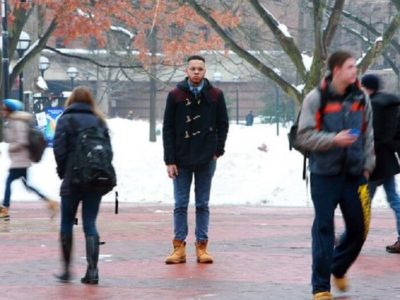Amid the myriad of lecture halls, festive college events and active student organizations, I find myself asking questions like, where do I fit in? Where are the people that look like me? No matter what I’m doing, these questions constantly cross through my mind like firing neuron transmitters.
Now entering my sophomore year, I’ve become more and more familiar with the underrepresentation of African Americans within the University of Florida, a Predominately White Institution (PWI). We are outnumbered and underrepresented in various aspects—physically, socially and professionally.
I have consistently been the only African American in many of my classes. I know, it sounds farfetched but it’s nothing short of the truth. It’s never comfortable feeling like you are out-of-place with no one to identify with. I’ve even gone to the extreme measure of searching my class’ roster to find someone else that may have the same amount of melanin as me. Did I do it to avoid making nonblack friends? Of course not. I did it to shamefully face my disbelief over the harsh reality of being the only black kid in the room.
One day, at the start of one of my classes, while everyone was finding a seat, another African American male entered the room. I immediately thought finally! He sat right next to me.
I cannot speak on how he felt, nor how hundreds of other African Americans feel. But I know in that moment I felt relieved. Relieved at the fact that I was not the only black kid in the room. I felt a sense of camaraderie, prior to even knowing him.
It was not a matter of black versus white. It was a matter of isolation versus commonality. The moment felt so surreal for me because I found myself consciously wishing for someone just like me—black—to show up.
That wasn’t my proudest moment. However, it was a very real moment for me. Many might say “make new friends” or “step out of your comfort zone,” but a lack of friends is not the problem. Making more friends and stepping out of my comfort zone isn’t the solution.
Though not supported by hard evidence, I’m sure that hundreds of other black youths feel this exact same way. Not because they feel afraid of meeting new people, but because they grew tired of constantly seeing how events, curriculum and demographics within a university reflect or cater to the dominant culture’s perspective, thus typically excluding nonwhites.
Not too long ago I attended a law-related club’s meeting. I arrived early. I found somewhere to sit and waited for the meeting to begin. As people began to flood in, seats began to fill, the room became louder. As the meeting progressed, not even one of the executive board members or club officers was African American. I found myself consciously rejoicing at the site of one of the officers being Latina. As I scanned the room out of curiosity, I noticed yet again I was the only black in the room.
Please don’t misunderstand me. I have seen efforts made by the university to acknowledge, accommodate and amuse us through organizations such as the Black Student Union as well as the entertaining performances of “Soul fest” and the Black History Month-tailored events.
However, I raise this question internally: Why are there very few African Americans who attend or support “nonblack” events and organizations?
I’ve come to realize that the constant lack of representation shows the lack of avenues that appeal culturally to African Americans within UF’s student body. Now, this isn’t supported with evidence, only personal experience—so please don’t quote me on this.
The dilemma of underrepresentation is widely apparent in the professional realm as well. Time and time again I’ve seen how many African Americans don’t get involved in professional or leadership positions. And, if they are, it is typically only within predominately black associations and clubs.
I often think to myself, why aren’t many African American students involved in the professional aspects the university offers, while knowing they are already outnumbered? I believe it is imperative to branch out. I’m not saying to exclude yourself from black associations, instead to also explore uncharted waters and deviate from the norm.
I’ve had a very reflective experience during college. Every aspect mentioned has been part of a eulogy to my internal convictions while attending a PWI as an African American. No one experience, time or event can sum up my thoughts. Instead, a multitude gives me insight on the grander scheme of things. If one message comes from this, I hope it is relatability. If not, a sense of understanding on a topic that hits home, yet is rarely expressed.



















